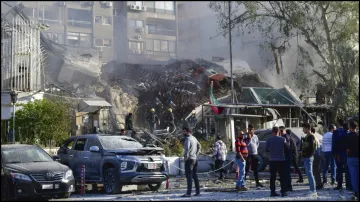Israel launches missile strike at Syria while reported attack on Iran raises fears of full-blown war
The attack came amid red-hot tensions at Iran fired air defence batteries at suspected Israeli drones in retaliation for a missile and drone attack by Tehran on Saturday. However, Iran has denied any external attack and Israel is yet to officially comment on the matter.

Damascus: Israel has carried out a missile strike at an air defence unit in southern Syria, causing material damage, according to the state-run SANA news agency quoting the Syrian military on Friday. This came at a time when the world and particularly the Middle East is on edge as Iran fired air defence batteries at suspected Israeli drones early Friday amid growing fears of a wider conflict in the region.
The warplanes were seen around the time loud noises and drones were reported near a major Iranian air base and nuclear site in Isfahan, which is 1,500 km away from the targeted area in Syria. It is important to note that the current Iran-Israel conflict had risen after a suspected Israeli airstrike on the Iranian embassy in Syria killed 12 people, including seven Iranian military personnel.
While sources said that Israel had carried out the drone attack on Iran in a tit-for-tat response after Tehran launched a volley of missiles and drones on Saturday over the Syria strike, Iran has so far denied any external attack, claiming to have shot down several drones after activating its air defence system over several cities as explosions were heard in central Isfahan city.
Iran and Israel's muted response
The Guardian reports that US officials have "confirmed" that Israel has carried out airstrikes against Iran, while the Iranian government sought to downplay the scale of the attack. Calls mounted immediately for an urgent de-escalation. At least three explosions occurred above the central Isfahan city, which holds facilities for Iran's nuclear programme, although they were reported unharmed by the attack.
Senior army commander Siavosh Mihandoust was quoted by state TV as saying air defence systems had targeted a "suspicious object". An analyst told Iranian media that mini drones flown by "infiltrators from inside Iran" had been shot down by air defences in Isfahan. There was no mention of Israel in official comments and news reports, so it is unclear whether Iran was under any kind of attack.
The strike in the central city of Isfahan appears to have caused no significant damage and the muted way the story was told in both nations pointed to a determination, at least for now, not to further escalate their conflict. The Israeli military and foreign ministries declined to comment and there were no immediate public statements from senior politicians apart from hardline security minister, Itamar Ben Gvir, who sent out the one-word message "Feeble!" on social media platform X.
Iran's thoughts were spelt out most clearly by a senior Iranian official who told Reuters that Tehran did not plan a response now. "The foreign source of the incident has not been confirmed. We have not received any external attack, and the discussion leans more towards infiltration than attack," the Iranian official said on condition of anonymity.
Iranian media appeared to play down the significance of the strike. In official statements, there was almost no mention that Israel - or as it usually says the "Zionist entity" - was behind it. State television carried analysts and other pundits who all appeared be dismissive about the scale. Iran's reaction also appeared to signal that it did not want the exchange to go further.
Do people want retaliation?
Opinion polls in Israel have appeared to show no overwhelming desire for retaliation, with one poll on Thursday showing 48 per cent in favour of responding even if it meant expanding the conflict with 52 per cent preferring not to respond. "We're good, you can look around, we're happy here, not from the attack but I think the situation in the Middle East is complicated but Israel will always win and everybody has to know that," said Pavlo Tzuk, a resident of central Israel.
The prospect of Israeli retaliation has alarmed many Iranians already enduring economic pain and tighter social and political controls since major protests in 2022-23. Since the war in Gaza began in October, clashes have erupted between Israel and Iran-aligned groups based in Lebanon, Syria, Yemen and Iraq.
Israel had warned for days that it was planning to retaliate against Iran for Saturday's strikes, the first ever direct attack on Israel by Iran in decades of shadow war waged by proxies which has escalated throughout the Middle East through six months of battle in Gaza. Iran's response was unprecedented but caused no deaths and only minor damage because Israel and its allies shot down hundreds of missiles and drones.
(with inputs from agencies)
ALSO READ | No immediate plans for retaliation, says senior Iranian official after reported Israeli attack